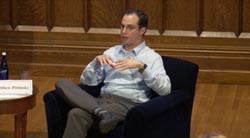Filed Under > TC Community
Technology Can Be Transformative - But Only in the Right Hands
New tools can help overcome unequal access, poor quality and inefficiency in education Matthew Pittinsky tells an Academic Festival audience.
Digital and online technology can solve some of the most pressing problems in education today, but only if teachers and school leaders develop the know-how to apply them in the classroom. Seated in an armchair on the Milbank Chapel stage opposite TC Provost Tom James, Matthew Pittinsky (Ph.D. ’08) delivered that and other pronouncements in a freewheeling exchange with his Academic Festival audience that ranged from some of the geekier aspects of technology and entrepreneurship to broader prognostication about the future of education.
